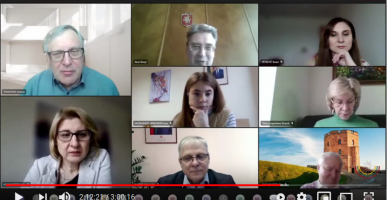Events
The 2020 Annual Report of the Lithuanian Academy of Sciences Presented at the Parliamentary Committee on Education and Science
29 04 2021
On 28 April, Prof. Jūras Banys, President of the Lithuanian Academy of Sciences, presented the 2020 report on the activities of the Lithuanian Academy of Sciences at a virtual meeting of the Committee on Education and Science of the Seimas of the Republic of Lithuania. The President briefed the members of the Committee on the work done.
As usual, the Lithuanian Science Prizes and the prizes of the Lithuanian Academy of Sciences established to honour outstanding scientists were awarded, and a number of events, conferences, and book presentations were organised. An agreement was signed with Pakruojis District Municipality to erect, at the initiative of the Academy, a monument to the famous Lithuanian scientist Theodor Grotthuss.
The Academy is active in the international arena: it coordinates cooperation between Lithuania and CERN and maintains relations with foreign partners and organisations, such as the European Association of Academies of Sciences and Humanities (ALLEA). The Academy delegated Prof. Vytautas Usonis, chair of the Academy’s COVID-19 Commission, to SAPEA (Science Advice for Policy by European Academies), which advises the European Commission. Last year, the Academy inaugurated two foreign members from Estonia. The President of the Latvian Academy of Sciences paid a visit to discuss cooperation.
The central mission of the Lithuanian Academy of Sciences is providing expert opinions. In 2020, the members of the Academy carried out almost 800 expert examinations. In addition, the Academy submitted a number of recommendations that were relevant to the future of both Lithuania and the whole European Union. Expert opinions were prepared on the issues of vaccination and 5G technology. Last year, nine resolutions and scientific recommendations were submitted to the country’s public institutions. The Academy’s Commission on COVID-19 continues its highly effective work in preparing proposals to politicians and the public and in carrying out assessment of the latest scientific information on the progress of the pandemic, vaccines, etc.
The Lithuanian Academy of Sciences is a publisher of a number of periodical research journals and science popularisation books. This year, the Young Academy of the Lithuanian Academy of Sciences will have ten new members. The members of the Young Academy give lectures and talks, present new books, and are active in maintaining contacts with young academies in other Baltic countries. Construction of the extension to the Wroblevski Library of the Academy of Sciences was completed with the necessary state funding, and now interior decoration remains to be finished. In autumn this year, the extension is expected to be opened and the renovation of the old building to begin.
After listening to the report, the members of the Seimas pointed out that cooperation between science and business was still insufficient and asked how the Academy was involved in this process and how it proposed to stimulate it. Prof. Banys emphasised that the Academy constantly encouraged researchers from universities and research institutes to engage with industry. For example, after an Academy-initiated visit to one of the largest and most successful electronics companies Teltonika, an agreement was reached to establish a joint laboratory at Vilnius University. Mediation of this kind is to be continued.
Members of the parliamentary Committee were interested in the Academy’s opinion on the decision of the Constitutional Court, at the end of last year, on the arrangements for the funding of research and studies and on the monitoring of the implementation of the resolutions of the Lithuanian Academy of Sciences. Regarding the decision of the Constitutional Court, Prof. Banys expressed his personal opinion, according to which the decision was very good: if researchers are guaranteed basic funding, it will help their work. Bookkeeping of points for achievements was definitely too much. However, there will probably be a transition period for the implementation of the solution; preferably, it should be an evolution. As for the recommendations, much more remains to be desired: many recommendations are proposed and sometimes there is no response, but at least there is peace of mind that the Academy is giving an opinion.
Prof. Artūras Žukauskas, chair of the Committee on Education and Science, thanked for the presentation of the report and summarised that having heard the report, the Committee could also give recommendations to the public authorities, in particular, that resolutions were adopted, but there was no response in most cases. In his opinion, although the presentation of the report of the Lithuanian Academy of Sciences took less time than many of other items on the Committee’s agenda, the Academy’s resolutions and recommendations were about the future of the country’s science, and since attention to them was insufficient, the committee needed to regain focus, particularly in the context of the draft budget. Committee’s actual recommendations are expected next Wednesday. Prof. Žukauskas concluded by saying that he himself was an academician, that he was proud that the LMA was carrying out numerous activities with a limited budget, and wished the Lithuanian Academy of Sciences well for the future.
Dr Rolandas Maskoliūnas, chief specialist for public relations of the Lithuanian Academy of Sciences
Translated by Diana Barnard
